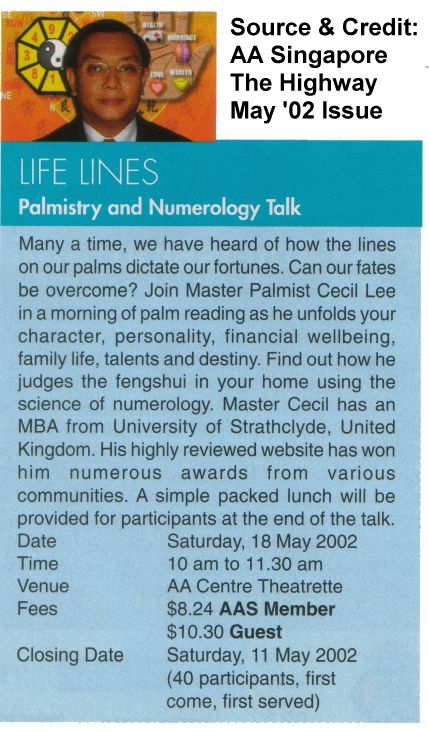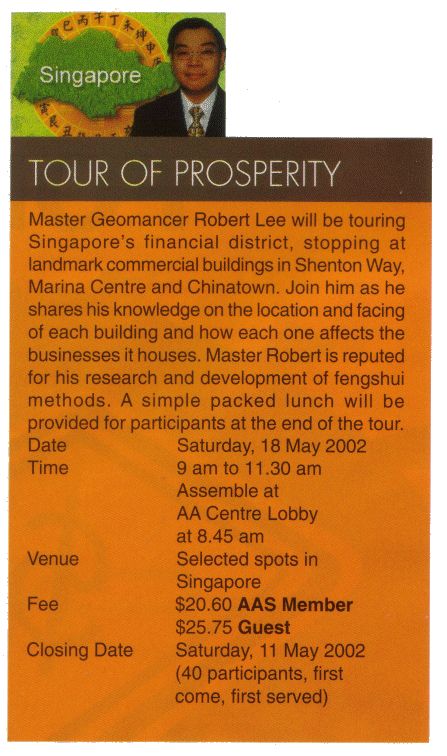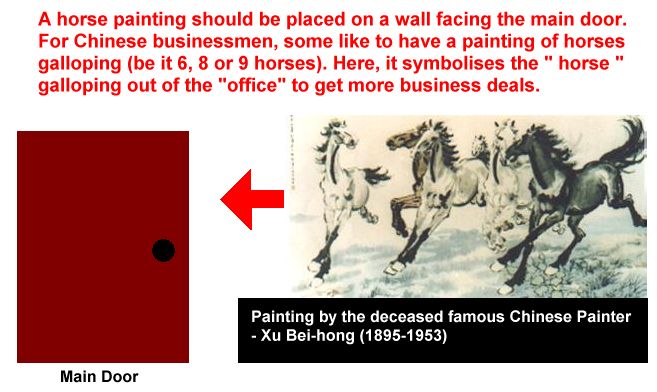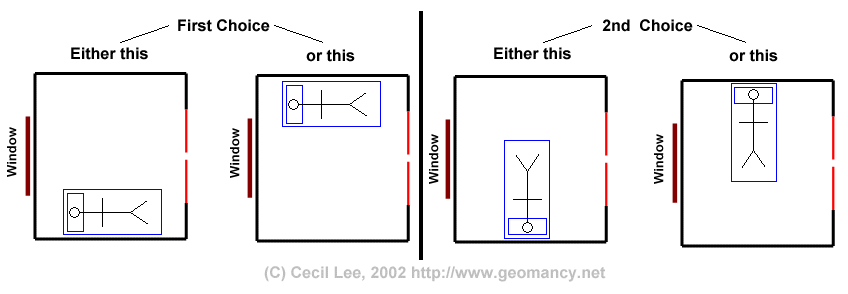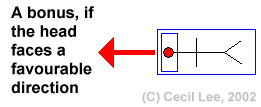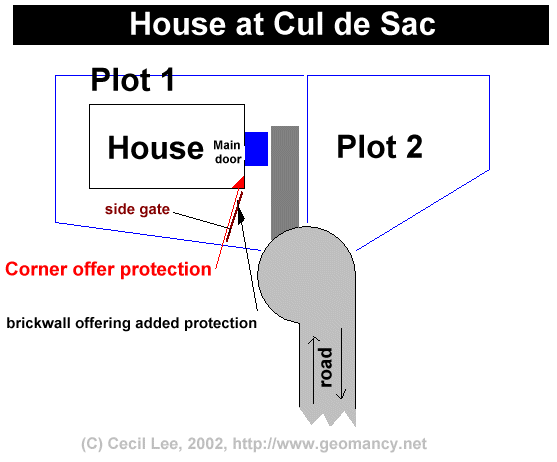-
Posts
36399 -
Joined
-
Last visited
-
Days Won
136
Content Type
Profiles
Forums
Blogs
Events
Gallery
Store
Articles
Everything posted by Cecil Lee
-
Dear `Seeker', There are many ways at looking at the Trigrams and it's relation with the premises. However, what you had mentioned is very similiar to `life associations' or eight aspirations/associations concept. In my opinion, this is quite general and not specific. And therefore, it is hard to say for sure if this type of reasoning can always work (most of the time if at all - too general an assessment of the situation). The closest to this is to say that the Ba Gua mirror is often used because it represents a family (close-kit) and what better symbolism is a family unit which is considered to be a very strong `arrangement'. Otherwise, it is difficult to apply what you had mentioned below. Furthermore, nowadays, a family unit is getting smaller and the most an average family may have is a few children. Some even have only one or two children. And it is difficult to see if what you had mentioned i.e. the reasoning `flow' as there are few examples. Warmest Regards, Cecil
-
Dear Anon, For a 529, try to place 6 coins above the location. If SE and S are in the same room, then it has to be looked at closely. Warmest Regards, Cecil
-
Dear Alan, As mentioned earlier, you have to compare both charts i.e. Period 7 vs Period 8. Only if Period 8 charts looks: 1. either more favourable and/or 2. equal to Period 7 in many aspects You can do renovations in Period 8. If Period 7 chart e.g. especially if it has a double 7's at the main door (I say - if this is the case); and in Period 8, there is no double 8's at the main door. In such a situation, I would personally stick to Period 7 chart - in most instances. Without comparing both charts as stated earlier, there is no way to know which period is better. Alternatively, you can (forget or not view Period 7) chart. But instead, look a fresh at Period 8 chart. If the Period 8 chart - looks `reasonable', you can then go for Period 8. These are the two most reasonable way of evaluating whether to go for Period 8 or not. Warmest Regards, Cecil
-
Dear Wasis, 1. In my opinion, I personally find your question `tough' to answer. 2. Usually, taking the lawyer's term: cavet emptor or `let the buyer beware' should be more appropriate ... choice here. 3. There is a further `twist' to this. Nowadays, there are so many commercial items. Simply go to any `Feng Shui emporium' type of shops on the internet and one can see .. as you mentioned so many `wealth', `protection' or `prosperity' type of figurines. These comes in many forms. Many of these should be classified as under " decorative items' as suggested in the attached `caricature'. 4. Traditionally - What constitutes as an altar object? 4.1 In the religious sense, many of these figurines had their eyes painted. Once these eyes were `painted' by a priest, these are considered altar objects. 4.2 We also find, buddhist stones. Many of these are stones or rocks carved with a religious figurine. And the owners usually encase these objects in beautiful gold casings - after they were blessed by priests in temples. 4.3 Objects or figurines that we ourselves, purchased from a temple and `invite' them to our homes. 4.4 We voluntary and place these objects or figurines on our `altar'. The above, is a rough view of what objects on an altar is like. Frankly, other objects are more difficult to classify. And as mentioned above " cavet emptor " prevails. 5. No, the altar should preferably not be placed on the same wall as the toilet. This is considered inauspicious. Warmest Regards, Cecil
-
Dear Anon, 1. I was pondering over your question. Reading it and replying other questions and re-reading it. I literally end up `scratching' my head - not so much as how to answer this type of question but rather, how to do it `effectively'. 2. Anyway, paying homage to a sector or Feng Shui based on life associations or aspirations is not gonna work - for many of us. 3. It does not matter if the `career sector' is in the bedroom or as you had mentioned the toilet. In my opinion, it does not matter. When we apply Feng Shui, we try to apply Feng Shui that can work for most of us. And this is one aspect `paying homage' to a sector or sector Feng Shui.... does not seem to work. Warmest Regards, Cecil
-
Dear Anon, Single stretch of load bearing wall which looks like beams is considered `sha qi'. However, do take note that:- 1. If one does not sit under it, there is relatively no issue. For beams, if one sits below it for more than 1 1/2 to 2 hours each day for a year, the `effects' (negative) can be felt. 2. Do take note that multiple beams that are close to each other e.g. 1 feet interval or less and lots of it that looks like stripes do not pose a problem. Only single beams should be considered. Warmest Regards, Cecil
-
" To be or not to be a member " Perhaps, we could ask `Sherlock Holmes' or Dr. Watson? 1. Often, the question comes to our mind: 2. Many sites in the Internet `requests' that you become a member. 3. Usually, this is `required' in order for us to post a question or use the tools available in the site. 4. Many of us are apprehensive of becoming `members' of so many sites. And each of us have our various concerns:- 4.1 How am I able to remember so many login accounts and passwords? 4.2 Will my information be safe? 5. What is the rationale for becoming a `member'. 5.1 Frankly, it is not so much of becoming a `member' that is important. 5.2 The main rationale is because, only if one creates a `personalised' account, then one can then customise the tools to our use. 5.3 One good example is this forum. The Free Advise Forum You can always login as a guest user but, as a guest user, there is no personalisation of the account. For example, having joined the forum as a `member' (or call it any name) one can then use functions like `post a message' or `mark as read' earlier messages. I find `mark as read' an important feature to a specific `member' account. As you can then know for sure, that new messages are not missed. Additional reason for being a `member' is that you can `listen' in to the forum. The On-line Report Tools Here, imagine, without a personalised account, profiles that you had created, would be `removed' and each time you log-out. The next time, you log-in to the on-line report tools, you have to re-create all the reports again. Therefore, the next time, when you are figuring whether to join as a `member' in any website, you will have a better understanding of why you need to be a `member'. Of-course, be selective in the type of forum or resources that request you to join them as a member. As for the question "Will my information be safe?" Do look out for the Privacy Terms of the site. In our case (Geomancy.net), our Privacy Terms are found in the url: http://sg.geomancy.net/about/privacy/privacy.htm Simply put: " Geomancy.net does not sell, rent or lease its customer lists to third parties. " Warmest Regards, Cecil Lee Center for Applied Feng Shui Research P.S. Yesterday, I was thinking on this issue and reflecting on why I avoid joining sites as a `member'. It strikes me that in most situations, it has to do with personalisation as mentioned above. I hope you can now have a better understanding of this `qwirk' becoming "members". Which in-fact, the term does not really mean in the true sense of `members' as what we know today. Perhaps, we can give it another more `accurate term'. For now, sign-up / members will always be a common occurence!
-
Dear Wendy, Based on the Eight House or Eas/West Group of persons, it is always advantages to spent time at a good sector. For a chef, it would be nice if he can be located at a station that is suitable for him/her. However, here are some of the preferred options:- 1. Wherenever possible, the kitchen and stove should conform to Shapes and Form Feng Shui. 2. For a resturant, it would not be advantages for the kitchen to be cited at the North sector (water position). Where possible, the stove should not be along a North-East alignment. 3. Only after Para 1 is taken care of, and if the location is favourable to the chef, then this is fine. 4. It is `nice to have' him facing a good direction but this is only after Para 1, followed by Para 3 has been looked at. Warmest Regards, Cecil
-
Furtehr to what I mentioned, this caricature list the important `rulesets' regarding the placement of figurines... Warmest Regards, Cecil Lee
-
Dear Rufina, Although most often, figurines do not possess any special powers. However, figurines of deities (gods) or or famous religious persons should preferably not be placed:- 1. Whenever possible, try to avoid placing `such objects' facing directly the main entrance door. (They do not symbolise security guards for the home). 2. It is inaupicious to place such figurines on the same wall as the toilet door. 3. Where possible, they should not be placed facing bedrooms. It is felt that looking into a human being room is `dirty'. Simple things like changing clothes etc.. are usually done in the room. 4. For an altar, it is very inauspicious for it to be placed facing a dining table. Here, it was felt that the deities or gods should not be `seeing' one eating. 5. Where possible, especially if it is an altar, it should face clear space especially if there is a window looking out of the frontage of the house. These are the most common `rulesets' relating to placement of altar deities. And in many cases, it relates also to religious objects (most of the time). Attached please find a caricature, on this subject. (Not available for those who subscribe thru mailing list. Need to login to website forum). Warmest Regards, Cecil Lee
-
"Just a note of special thanks to Mr Cecil Lee, who not only returned my call promptly but spent another hour of so to answering my various questions. Here, I witnessed an individual so truly dedicated to his belief in the study of Feng Shui for the betterment of life and the unselfish sharing of his wealth of knowledge. Must really applause both of you for the load of information available on your site. Being very new to Feng Shui, I've yet to see it work but really appreciate the advice given. Thanks and all the very best only!" - Alicia, Singapore
-
Dear Singaporeans / AA members, Attached please find the write-up of talks and tour organised by Automobile Association Singapore:- A. Palmistry and Numerology Talk by Cecil Lee Briefly, Date: Saturday, 18 May 2002 Time: 10am to 11.30am Venue: AA Centre Theatrette Fees : $8.24 AA member $10.30 Guest Closing Date: Saturday, 11 May 2002 (40 participants - First come first serve) For more details, please see attached article. Source and Credit: The Highway, May 2002 Issue, the official publication of AA Singapore. B. Tour of Prosperity by Robert Lee Briefly, Date: Saturday, 18 May 2002 Time: 9am to 11.30am Assemble at AA Centre Lobby at 8.45am Venue: Selected spots in Singapore Fees : $20.60 AA member $25.75 Guest Closing Date: Saturday, 11 May 2002 (40 participants - First come first serve) Please contact AAS Programmes & Activities directly at 68312140 for reservations for the talk or tour. Hey!, If you are not an AA (SINGAPORE) member, why not join the AA Today! URL: http://www.aas.com.sg/ See you at the Talk or Tour! Warmest Regards, Cecil & Robert Lee P.S. Please refer to attachment below for more details about both the events.
-
Dear Anon, It is very common for FS practitioners to apply basic Ba Zi. Most commonly, depending on the FS practitioners and their methods, usually, out of convenience or simplicity, some may simply use:- 1. Year of birth 2. Month of birth It depends on the practitioner. Some look at Year only, some look at month only some look at year, month, day and time. It is always prudent to ask the FS practitioner what level of analysis are doing for you. Some practitioners may apply Year, Month, Day and Time but this does not mean that all practise or sue same methods. The better FS practitioners would apply Year, Month, Day, Time and House of Life and House of Conception. This is becase each `pillar' e.g. Year has an additonal two elements each e.g. Heavenly stem and earthly branch. When 1 pillar = 2 variables, and if there are 6 pillars (Year, month, day, time, Life and Conception) the variables analysed will come out to 12 variables. When this is provided, a more accurate analysis can be done as concepts like double, triple combinations can be compared. The more variables there are, the more, double, triple combinations. However, as mentioned, 1972 is the considered as the Year of the Water-Rat. This is very very basic Ba zi or kindergarten Ba Zi. Overall, here, one is also concerned about element and it's strength. And a Year analysis as `Water-rat' does no help for a person. In your example, the `Year pillar' consist of Water (Heavenly stem variable) and Rat (Earthly branch variable). In my opinion, it does not tell anything but pure basic information of just the Year element. In my opinion, this type of Ba zi, should not considered as it is unaccurate and misleading. Warmest Regards, Cecil
-
"Mr Cecil Lee, Thank you very much for your quick reply. I would like to take this opportunity to congratulate you for your Applying Feng-Shui course and especially the Flying stars course. Your courses were easy to understand, clear, precise and very imaging. I will strongly recommend the Flying Stars course for those who want to have a better knowledge on the Flying stars. I almost finish my course. I am doing the exercice on the case studies. As soon I finish, I will send you my home work for your appreciation. I am interested in having more Feng-Shui courses with your school." Best regards, David Tan
-
Dear Vivek, I was waiting for your attachment. Anyway, we have credited into your account the relevant reports for you to generate for your family. We hope to receive your attachment via e-mail. Do take care! Warmest Regards, Cecil
-
Dear Anon, Please see below:- Our Best Value packages are:- Package 2 (Premium) =================== Home + Self Feng Shui Package 2 (Premium) for Family of TWO 2 x Yearly Ba Zi, 2 x Career, House Analysis,1 x Auspicious Dates... Usual: USD$412, Now: USD$88 URL:- http://www.geomancy.net/products/packages/premium-package.htm or Package 1 (Comprehensive) ========================= Home + Self Feng Shui Package 1 (Comprehensive) for Family of THREE 3 x Yearly Ba Zi, 3 x Career, House Analysis, 3 x Auspicious Dates, House Hunting... Usual: USD$754, Now: USD$108 URL:- http://www.geomancy.net/products/packages/complete-package.htm These two are best value packages that includes most what you need for a very comprehensive home audit. It is good that you bring up this crucial point. Overall, not only must we be careful of the products but who recommend them. For example, good or serious books or even sites on Feng Shui don't often sell products unless asked. This is clearly seen from the books written. Serious authors or Feng Shui practitioners would normally give key issues of any concept or theory for understanding. After you had read the topic or subject, you should be able to know:- 1. What is the aim of the concept or theory. 2. What are it's strengths and weaknesses. Unfortunately, many book authors, do not simply do this but rather, fuel our need that such a such object is good for this or that without much personalisation. Therefore, if one picks up a book riddled with e.g. enhancing `sectors' such as romance, career etc.. by buying material goods in my opinion do more harm to society than good. If anyone is familiar with this forum, for many years since 2000, many questions posted in the forum are one liner questions like:- My date of birth (d.o.b) is .... tell me about my wealth sector? And even today, anyone posting their d.o.b even with other questions attached to it will normally be missed by me. For example, I would first open the mail. Then, maybe open it another time. When I see the d.o.b., I often skip it... entirely due to numerous other questions coming into the forum. The object of the forum is to give free advice, catalyst or help to understand better areas that are not clear and not a consultation service. A consultation service is different. Because, it involves analysing for someone and doing all the `homework'. This forum has always kept to this way of doing things. As for objects used as cures or enhancers, even if 6 coins or 6 hollow rod are valid, but it cannot be used generally for all occasions. Or one item fits all the bill. If you need a quick way to find out the purpose / aim and or strengths and weakness, you can do a SEARCH in this forum. For example 6 coins, bamboo flute etc.. and many examples of the real life usage will be shown. In my opinion, this is not a standard practise. But, I really see no harm with this. (True or not.. frankly I am not too sure). Where possible avoid books associated with Black Hat Tantric Buddhist Sect or Black Hat Sect as this is seen as a commercial ploy. Or any mention of Lin Yun or fixed template `Feng Shui'. As mentioned earlier, books that have three elements:- 1. Purpose and aim 2. Strengths and weakness of each concept or idea should be clearly stated. The rationale why this should be the case, is to ensure, that finally, each individual can make up their own minds or understand better the concept. But if the book talks `nonsense' i.e. providing cure after cure.. then there is really something amiss about the book. Warmest Regards, Cecil
-
Dear Alan, 1. Usually, in your situation, since you are looking into periods i.e. Period 7 or 8, which is based on one of the criteria of Flying Star Feng Shui. 2. If you are using Flying Star Feng Shui, it is always best to compare the two period's Flying Star to see which is better. 3. This is the most common method used today. For example, when we often look at current houses, which was build e.g. prior to 1984, the Period 6 chart was compared to Period 7's chart to see which is advantages to them. In your situation, it is best to look at or compare the two charts. Warmest Regards, Cecil
-
Dear Anon, 1. Yes, it is best not to be `involved' with religious objects if one can. 2. Recently many Feng Shui emporiums are in my opinion `selling' items that only burn a big hole. 3. I was infact disturbed a few days ago when I just took a glance at many of the Feng Shui emporiums. And all shorts of `rubbish stuffs'. It is a pity especially for those who are already short of cash and buy them to get into real problems. 4. Frankly, all this is also due to the consumer. For example, recently a friend of my father had asked me to help do a audit of their home. As usual, the house is littered with `three huge laughing buddha statues. And not less than three fish tanks all over the home. No wonder, these people cause problems for themselves. 5. Looking at some of the reasons for consumers to buy the objects or figurines made me laugh! For example, one has to rub the stomach of the laughing buddha daily. 6. Usually, it is best to retain exactly the purchase bag and simply tie it up and just throw away. Thanks for sharing with us your plight. I am not sure, if it is a good idea to list out urls of Feng Shui emporiums that sell mostly this type of goods? I am not sure whether, I should do it. Any opinions? Should I list out the stores that sell purely such stuffs or even those that sell partically proper cures and enhancers and make some comments? This would indeed be bad news for these emporiums. I normally do not do so, but, if you have any opinions about it, do let me know. Warmest Regards, Cecil
-
Dear Fran, Thank you for taking the effort to draw an outline of your house in relation to the cul de sca. However, Apologies, I still cannot see a clear picture of the position of your main door in relation to the cul de sac. For example, if your house driveway is covering the stretch of road leading to your neighours in the cul de sac, I could not see a road leading in and out for the owners or your neighours. The main door seems protected from the road. But as you had mentioned, it faces the roof of a neighour. You further mentioned that there is a tree to block the view of the neighour's roof. This can be a double edged sword. The rationale is because, the tree trunk could inadvertently slice thru (sha qi/poison arrow) at your main door. If you have the tree trunk slicing thru the main door, you can either i.e. apply the Triange effect i.e. placing two plants on each side of the main door such that the tree (that is blocking the roof) together with this two other plants form a `triangle'. When we take a look at it from an aerial view, (by joining the dots of this three will form an arrow head pointing away from the house). Alternatively, you may use a Ba Gua mirror in this case. Warmest Regards, Cecil
-
1. This painting is by a very famous Chinese painter by the name of Xu Bei-hong. 2. Xu Bei-hong, born in 1895 and died in 1953. Nowadays, this paintings are much sought after by collectors. And many forgeries of this painting is floating around. 3. For many Chinese businessmen, they love to place a painting of galloping horses. It can be 6, 8 or 9 horses. 4. Here, these businessmen, would normally place the painting on the same wall as the Main entrance door. 5. This symbolises, the horses, galloping out of the main entrance door, to get more business. 6. Do note that the horses do not face inwards of the door. 7. Please note that I am suggesting that you go out and go buy such a painting. 8. This article is to let you be aware, of this practise. Warmest Regards, Cecil
-
Dear Anon, 1. In my opinion, `lucky bamboo' is a marketing ploy. And the usual marketing ploy here is perhaps to ask a person to place it at the `East' side. Or the Wood area. 2. These my following reasons why using `lucky bamboo' may not be effective:- 2.1 Although East or South East is in my opinion, belonging to the Wood element, there is fundamentally no reason to use it there unless it can enhance the element at that sector. Under the Five elements concept, Wood (lucky bamboo) enhancing Wood has less of an effect. Assuming that Wood direction East is favourable, then water would be a better element. As water -> wood leads to a harmonious Five element concept. However, I would take it that if the rationale that since East is wood element, and the recommendation to enhance it with wood... is in my opinion, `kindergarten type of feng shui'. 2.2 In fact, wood if used wrongly may lead to legal entanglements or romance problems depending on the location placed. Since wood is associated with #4. 2.3 In ancient China, bamboo is a very popular plant and it is used to make chop-sticks and various other items. In fact, bamboo fire-crackers were popular in the past. And fire-crackers made by inserting power into bamboo was used to `scare of evil'. Thus the result is a " peace of mind ". Thus, bamboo plants are grown in a vase. A vase in Mandarin is called a " Hua Ping " (flower vase) and when we use simply use "Ping" or the vase, this symbolises " Ping An ". These two words `Ping An' means safe. Thus bamboo in a vase would imply peace and safety. Please see below:- Please refer to above. Each Feng Shui concept or theory has a specific purpose (aim) and strengths / weakness. It is good that you try to understand the various concepts. The key concepts are:- 1. Shapes and Form Feng Shui 2. Compass School Theory Part I: 8 house More advanced topics of understanding are:- 3. Compass School Theory Part II: Flying Star - Analyse Birth Chart of House 4. Ba Zi (Pillars of Destiny) - understanding element strength and luck periods. Warmest Regards, Cecil
-
Overall, the Castle Gate Theory has two main components:- 1. The information given earlier i.e. it is the tilting of the main entrance door 45 degrees to the main road. And this second part, the emphasis is that the Castle Gate Theory takes into account time dimension in Feng Shui. 2. One method is the combination of the use of Flying Star analysis with the Castle Gate Theory. Here, the combination of the Castle Gate with Time Dimension. Only in this situation then can the Castle Gate be effective. This is combined with finding an auspicious date to do the changes. 3. Let me introduce you to two buildings in Singapore that had effectively employed the Castle Gate Theory:- Reference map:- http://202.172.229.9/map.cgi?x=27864.5304851852&y=32232.1010851852&level=6&xyfile=&circle=&star= In the above map, try to locate two buildings:- 1. The Grand Hyatt Hotel (located along Scotts Road - somewhere in the middle right of the road shown in the layout plan). 2. Shaw House (located at the junction of Paterson Road/Scotts Road with Orchard Road - you should see this building at the lower half-middle of this map). Another building in Singapore also uses the Castle Gate Theory is the Cathay Building. (During World War Two, when Singapore was taken over by the Japanese, this building was the Japanese Propaganda Head Quarters. The reference map of this building is at this location:- http://202.172.229.9/map.cgi?x=29552.9305555556&y=31483.0694444444&level=7&xyfile= (bottom-centre building in the reference map). All these three buildings were not recent ones. For The Grand Hyatt and Shaw House, they were built around the late 1970s, there abouts. While Cathay building was built pre-World War II. It is not to say that the Castle Gate Theory is no longer popular in Singapore. It is because, many of the huge or mega buildings built today are designed by architects or rather `architects driven' and lesser influence from Feng Shui Masters. In the past, where an old tycoon, would entrust the building to the Feng Shui Masters first and architects have to `obey' their common. Nowadays, many of the companies are corporate companies or public listed companies who cannot afford to give top priority to `Feng Shui First concept' and architects second precedence. The trend nowadays, has `shifted' towards the affluent home or would be home owner who can afford to build houses. With greater Feng Shui awarness, many home owners nowadays do not necessarily take on ready made homes but if they can afford, they would likely take on `Feng Shui First concept'. In such a situation, when in doubt always check on the background of the practitioner. Warmest Regards, Cecil
-
Dear Ling Hui, 1. Attached please find the various options for best siting of a single bed. 2. Please note that the layout does not take into account of date of birth. 3. It is best to place the bed based on the attached illustration under the file: sf-bed-position.gif 4. An added bonus is (if the bed) can be positioned under the file: sf-bed-position-favourable.gif Warmest Regards, Cecil
-
Dear Nadia, Please see below:- Yes, a small courtyard at the center of the house is OK. Except that one must avoid (never) have a tree or plant at this centre point. A tree/plant at this centrepoint combined together with the courtyard, is the symbol of `KUN' and an inauspicious. Yes, this is acceptable. So long as the road is parallel to the main door. And there is usually some distance e.g. at least 1 metre distance from the main door. It can still be located a the north east, but in the layout of the kitchen, avoid having the kitchen stove on a NE alignment i.e. the kitchen stove must not along the `imaginery' line of this NE or rest along this NE line. It can say, be away from this NE line. Warmest Regards, Cecil Lee
-
Dear Fran, 1. Frankly, it is difficult to advise you based on a few descriptions. 2. Perhaps, if you have a photo taken from the cul de sac, showing partially the cul de sac, it would be ideal. 3. This is because, usually where the major `force' hits your home, this is the vulnerable area. And if the vulnerable area is a wall, this is quite OK. 4. But if it `hits' say the main door directly or a window of the house, then, a cure should be used. 5. Even if it hits the house, but if the house is angled, this should not be an issue. 6. Let me illustrate a serious cul de sac situation. Please refer to the attached layout plan (not available to those who listen in using a mailing list). In this attached diagram:- 1. Houses on the left side of the cul de sac faced a `serious threat' because the road for the cul de sac is on the `right side'. 2. If one looks carefully at the cul de sac in the illustration, one can see a top-view `sickle' or `chinese butcher' knife carving into Plot 1 and the plot below Plot 1. 3. When we design houses for a cul de sac, we would normally design it as shown i.e. the house layout as per Plot 1. 4. Here, the edge of the house at Plot 1 will counter-act the `sha qi' from the cul de sac. 5. Facing the main door parallel as shown in the layout, eliminates the threat to the main door. 6. A further brick wall on the side of the house will `take-on' the "knife-blade" of the cul de sac. Thus, in this layout plan, there is relatively no-need to use any ba gua mirror. 7. In fact, if we can properly tame the cul de sac, we can contrary to popular belief, collect exceptional wealth. 8. For example, this cul de sac is considered as a metal element because of two `ingredients' i.e. 8.1 it is circular representing metal element. 8.2 from a top-view it looks like a chinese butcher knife. And symbolically knifes are always made of some kind of metal. 9. Thus, the rationale for a brick wall, in particular the use of red clay brick wall, (unpainted) simply red clay brick walls represent `Fire element'. 10. When, this cul de sac `chinese butcher' knife hits this wall, it is a combination of metal with fire. Under the five elements concept:- http://www.geomancy.net/resources/theories/fs-5element.htm fire -> controls -> metal 11. So far, we had the opportunity to work with our clients to build houses of such nature and so far, many of the houses especially in such a serious situation as shown in the illustration, has been good. Sometimes, when we all think that cul de sac are totally bad, is wrong. If we can `tame' the elements, we can take charge of the situation. 12. In the above, example, that is why, based on your simple description, a ba gua does not necessarily mean a good option. It depends. Warmest Regards, Cecil
Forecast
Free Reports
Useful Handbooks Guides
Feng Shui
- Feng Shui Resources
- Fun with Feng Shui
- Photo & Pictures
- Encylopedia of Feng Shui
- Singapore Property Review
Chinese Horoscope
Palmistry
Feng Shui Consultation
Services
Order & Download Forms
Main Navigation
Search



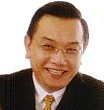
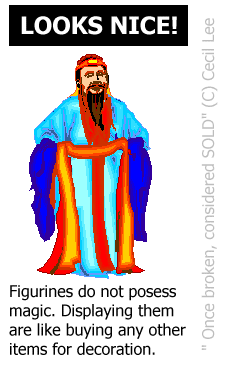
.gif.e2836996582bf618e587abfcf204e4ae.gif)
.gif.0f2732d4a7b515b7458e0af66eabbf2b.gif)
